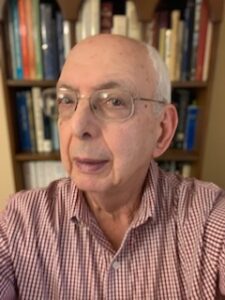“Religion Clause” – A Great Resource on Church-State Separation
Howard M. Friedman, Distinguished University Professor and Professor Of Law Emeritus at the University of Toledo, writes regularly on issues of church-state separation on his Religion Clause blog, named on of the 100 favorite blogs of the American Bar Association. We asked Professor Friedman to tell us about his approach and how his Jewish identity in particular informs his work. He was kind enough to reply with the following:
 I welcome you to Religion Clause, a blog whose title refers to provisions of the First Amendment. Religion Clause follows legal developments that impact religious liberty and which bear on separation of church and state. These issues are not only ones of academic interest to me, but also ones that impact my identity as a practicing Conservative Jew who is an active participant in American society.
I welcome you to Religion Clause, a blog whose title refers to provisions of the First Amendment. Religion Clause follows legal developments that impact religious liberty and which bear on separation of church and state. These issues are not only ones of academic interest to me, but also ones that impact my identity as a practicing Conservative Jew who is an active participant in American society.
Church-state separation is often mistakenly seen as anti-religious. Nothing could be further from the truth. Roger Williams, the founder of Providence colony in colonial America understood this well. In 1644 he wrote that when a gap is opened in the wall of separation between the garden of the church and the wilderness of the world, the garden inevitably becomes a wilderness. Without Constitutional protections, the government inevitably steps in to define religious doctrine for us and to identify for us our religious priorities.
In the United States, even with a robust separation of religion and government, we see hints of the danger. Here is a trivial example. Why does the Postal Service tell us that the only Jewish holiday important enough to rate a special postage stamp is the minor festival of Hanukkah? No commemorative stamp has ever been issued to mark Rosh Hashanah, a festival of far greater importance in the Jewish tradition. In pre-Internet days, Rosh Hashanah was the occasion for mailing greeting cards to dozens of friends. However, government is always tempted to substitute its theological understandings of religious practices for those which authentically stem from our religious traditions.
If we move our focus to Israel where the Chief Rabbinate is an integral part of the governmental bureaucracy, we see the same phenomenon more clearly. My ability to pray at the Kotel with a minyan that includes women is restricted by the government. At best we can assemble to pray according to our religious tradition on an uninviting platform separated from the elaborate main plaza facing the Western Wall where Jews with other traditions are free to pray. Without separation of religion and state, government often imposes religious traditions on the minority.
Over the decades, many have claimed that “America is a Christian nation.” The First Amendment rejects that notion. However, Christian understandings of moral and social issues are often invoked by legislatures as the unarticulated basis for legal restrictions. A secular society is not an anti-religious one; it is a society in which the religious of all stripes, as well as the humanist, the secularist and the non-believer, feel equally welcome as an important part of America. That is the vision reflected by the First Amendment.
